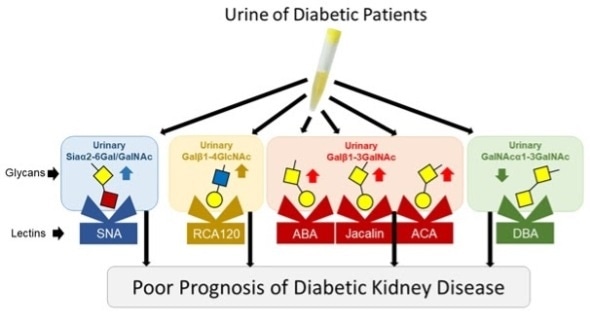Jul 17 2018
Researchers at Okayama University report in the journal Diabetes Care their findings on measurements of ion concentration in solutions for clinical and environmental research. The results are expected to improve prognosis of diabetic kidney disease.

4 types of promising glycans which could be useful prognostic indicators of DKD.
Our results suggest that higher levels of urinary excretion of Siaα2-6Gal/GalNac, Galβ1-4GlcNAc, and Galβ1-3GalNAc and lower levels of urinary excretion of GalNAcα1-3GalNAc could indicate poor renal prognosis in patients with type 2 diabetes.
One of the complications of diabetes is diabetic kidney disease (DKD), a condition in which the kidneys do not filter blood correctly and, eventually, fail — DKD is one of the most common causes of kidney failure and affects around 40% of patients with diabetes. DKD is normally diagnosed by checking for proteins, in particular albumin, that leak from the blood into the urine as a consequence of the malfunctioning filtering; these proteins are used as biomarkers to monitor the progression of DKD and predict the renal prognosis at the early stages of disease. However, new biomarkers that could help to identify the onset of DKD earlier and to predict the renal prognosis more accurately would be very beneficial to help patients with a rapid deterioration of renal function.
Recently it has emerged that glycans — complex molecules made of interlocking sugar molecules — and their enzymatic modification (glycosylation) have a role in diabetes and in the progression of DKD. Because of their complicated structure, glycans are technically difficult to quantify in urine samples, and few studies exist about the role of glycosylation in DKD. However, a method previously introduced by Professor Jun Wada, Dr.Koki Mise and colleagues at the University of Okayama in Japan, authors also of the present study, enables high-throughput quantification of the binding of glycan to 45 different proteins, opening up the investigation of the association between the glycosylation profile in the urine and the renal prognosis in patients with diabetes.
The study that the authors report in the newly published paper started in 2012 and involved 688 patients with type 2 diabetes, who were monitored over a period of 4 years, and 134 control patients with neither diabetes nor DKD. The results suggest that levels of glycans are significantly associated with the evolution of renal function, and that changes in the glycosylation of a particular protein occur in the early stages of DKD, before other detectable signs of deterioration of renal function develop. Because the indexes for glycans are associated with the renal prognosis independent of other indicators commonly used, adding the combined glycan index to other indicators of the progression of disease can significantly improve the prediction of the renal outcome. The results of the current study are also of fundamental interest, as they provide insight in how glycosylation changes in DKD.